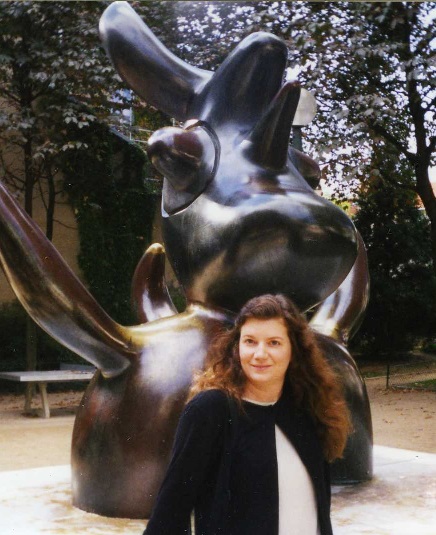
Haunted MTL Original – Mad Dog – Kristin Harley
“Mad Dog” by Kristin Harley
“Stop screaming, Karen!” hissed Stephen Jeffries. “It’s not as if he’s sprouted fur, or a tail.” He cradled his son’s head in one arm and brandished the clippers. “I’ll cut them this time. Keep your voice down before—” Stephen stroked his son’s blonde curls and sighed. “He’s a teenager—he has a fast metabolism—”
“You know that’s not it,” sobbed Karen. Husband and wife both looked down at the sleeping twelve-year-old, his young face untroubled, his blond head suddenly adult and strange from his recent haircut. Stephen had been reassured by Reverend Graham this sedative would last all night. “They used to grow in a month—now it’s days,” added Karen. “And they’re not fingernails! Are you blind? They’re claws!”
Stephen bent forward until his forehead touched the hand of his young son Timothy. It was so soft, still a boy’s hand but soon to grow rough, clutch a football, lift high a Bible and clasp, he prayed, a woman’s hand before the altar at All-Souls-in-Virtue Baptist Church. The fingernails had indeed disappeared, grown over by a bulge of rough skin under which the thin spears extended. Each time the new growths curled more onto themselves, increasingly concave and narrower, and sharper, and more resistant to the blade.
“I have to do it,” Stephen said in despair. Karen backed away. When he had finished, Stephen wandered into the bedroom of his daughter and, distracted, sank down to her mattress. The phone rang, and Stephen heard Karen’s footfalls outside the bedroom door. Tenderly he reached down to smooth the silken cheek of his sleeping daughter Rachel. “Ouch!” he said, and withdrew a bleeding hand. Two perfect, pointed teeth protruded from either side of her lips. She looked like some angelic vampire, like Kirsten Dunst in that abominable film that he had forbidden Rachel to see with her friends.
Stephen sat in the half-light of the teenager’s bedroom with his head in his hands. “Why, Lord?” he said aloud. “If it were me…but why my children? Why Tim and Rachel?” Rachel yawned in her sleep, exposing the sharp fangs.
Karen’s silhouette appeared in the doorway. Stephen stepped into the hall with her, closing the door behind him. “That was Larry Showalter,” whispered Karen. “It’s spreading through the congregation.” Her hands found his, and they both squeezed. “And not just the children. People’s fingers, their teeth…” She swallowed. He pulled her against him. “And some have—well, they’re—Larry says it’s fur. And a few have…their tailbones…”
“Martin Howard called me earlier,” Stephen whispered into her hair. “He can’t drive without a slipcover on the steering wheel now—he rips it.”
Karen’s arms slipped around his neck. “I’m frightened, Stephen!”
Involuntarily he stiffened as he always did when he touched Karen, and he hated himself. Even now, after twenty years of marriage, he couldn’t shake the memory that reared up every time he kissed his wife, or touched her, or made love to her—the memory of the animal he had once been…
“It’s the work of Satan,” Stephen whispered, and he pulled back to wipe the tears from her face. “We’re being tried. Satan is alive, Karen, but so is God.” Karen nodded. “Go to bed. I’ll be along in a minute.”
She wiped her face. “But why don’t you come now?”
“In a minute,” he insisted, and he turned to the bathroom.
He flicked on the light and shut the door, but when he heard their bedroom door shut, he turned off the light again. LEDs hurt his eyes now, and it was increasingly harder for him to conceal this from an attentive wife who was always turning on an extra light for him while he studied the Bible in the evenings, who needed a bright make-up mirror. Stephen stood before the bathroom mirror, seeing clearly in the reflected light from the moon outside. He opened the medicine cabinet for the bottle of peroxide, swished some in his mouth and spat it in the sink. His saliva was pink. Painfully, he moved his tongue along the inside of his cheeks where his bicuspids, finely honed now into points, had cut into them.
He was trimming his fingernails every night now, standing alone in the bathroom with the dog clippers just as he had trimmed Tim’s. But there was nothing he could do about his teeth or the small knot at the base of his spine that was beginning to protrude. His toenails had changed, his hearing was more acute; high-pitched sounds were excruciating. And his sensitivity to light, his night-vision… Animals, Stephen thought. I’m becoming an animal, aren’t I? We are turning into beasts!
At the end of another school day, Anita Housen sat in the empty schoolroom to correct papers. She felt tired and frustrated. A relatively new hire, she wondered if her colleagues had been right to warn her.
The children were enjoyable enough, respectful, but they were incurious. Anita was forced to present “alternatives” to evolutionary theory. She had to “teach the controversy,” and so she emphasized the scientific method in her lectures and her labs, trying to get her eleventh-graders to see the distinction between empiricism and cherry-picked data, between open-ended questions and agendas. But her students wanted fast answers, facts they could memorize to pass the standardized tests and enter college.
Finally she stood up to leave. The hallway lights were off. She shut the classroom door behind her and turned, and then she fell back against it with a small cry. A darker shadow had peeled itself from the others. “Miss Housen?”
“Who is there!” she demanded. A burglar—a rapist—an angry student? The huge form bore down on her. She gripped the doorknob but the dim light illuminated his face—his handsome, gentle, pain-lined face. “Why—Mr. Jeffries.”
“May I please speak to you?”
Anita marveled at the change in him. Even in this light she could see he was unshaven. His blond hair, normally so sleek and full, which provoked such giddiness among female teachers, hung in grimy strands. Those blue eyes—which likewise had been voted “sexiest” by her colleagues in the lounge, where they giggingly rated the charms of the community’s men (the Reverend Graham had won “scariest”), those sexy eyes were now bloodshot and weirdly bright. She wondered if he had fallen off the wagon again. “You don’t look at all well, Mr. Jeffries.”
“I’m not, but may we talk?” he pleaded hoarsely.
“Why don’t we go down the hall—?”
“No. We’ll talk here.”
“Just to the Faculty Lounge…”
“Help me!” He placed his hands on the door on either side of her, and her heart thumped in her chest. Then he slumped. “Please,” he added.
They stood there facing each other, and it was different than when she had faced him during those abysmal school board five months ago. He had always been disarmingly soft-spoken, even courtly, but his faith was iron-hard and his arguments dishonest. With the doorknob jabbing her from behind, Anita shifted. He stepped aside for her, and the shadows fell over his face again. “I’ve missed having Rachel in school,” she ventured. “Since you’ve managed to rewrite the curriculum, would you consider allowing her to come back and graduate with us?”
He made a small sound. “Rachel has disappeared, Miss Housen! She’s been missing for three days. I’m desperate!”
“My God, Mr. Jeffries, I didn’t know. There was nothing on the news—”
“No police,” he rasped. “Tell no one. Promise me!”
“But you must report it. We—”
He seized her by the arms. “No police!” He shook her a little and her hands curled into helpless fists that leaned against her mouth. “I need to learn about evolution,” he said. “I mean, I need to know what you know about it, Miss Housen. When you said we—that the Reverend Graham knocks down straw men, I—it suddenly made me think—”
“That was not an attack on anyone personally,” she replied for what seemed like the hundredth time. He still gripped her. She stammered on, “Asking questions is not unscientific. But Graham and you only revealed your misconceptions.” She was afraid to try to pull away, for she did not know what to do if he didn’t release her. “Don’t be angry—”
“I’m not angry. I’m frightened.”
He let her go but stood in her path. “Why don’t we discuss this later?” she asked in a tone that managed to sound soothing. “Let’s do something about Rachel, first.”
The shadow’s head lowered and she heard him sob. “I made a false claim at those hearings, Miss Housen, just to win. I knew the plaster cast showing dinosaur tracks alongside human footprints is fake yet I used it, because I knew that it would sway the board. Rachel called me on it later. She yelled at me.” He put a hand to his face. “Before she left she called me a hypocrite, said she didn’t want to be like Karen and me, that if she stayed with us she’d be no good for anything but Liberty University. She doesn’t want to go there! Now she’s gone and it’s my fault. Or if someone has her…”
She reached for his arm but he shied from her.
“Both my children are changing,” he replied. “I didn’t believe it could happen but they’re physically changing. What if they revert to animals? I should have listened to you!”
“You’re not making any sense—and no, even if it were possible for humans to ‘revert,’ to suddenly change, that would actually violate evolutionary theory. Of course your children are changing! That’s natural.”
“Look,” he said and pressed the light switch. The fluorescents came on and Anita Housen stared. What had appeared in the gloom to be an unshaven face was a furred and whiskered creature. The eyes were still blue but they had the narrow convex slits of cat’s eyes. The nose was flat. Whiskers framed his still beautiful lips and extended to the pointed ears, which twitched with emotion. His fur, blond like his hair, extended from his cheeks down his throat to his chest and arms. It poked out, comically, of his unbuttoned cuffs, like some Victorian beast. “Do you see?” asked Stephen Jeffries’s voice. “Do you see?”
Then he was running from her as a cat would run, on all fours down the long gray hallway, leaping forward like a cougar and pushing the door open.
#
Usually at the Second Precinct Police Office a slow night was a good night. Usually.
“Graham is at it again,” groaned Sergeant Merrick. He tipped his chair back with a groan, throwing both hands as far back as he could to massage his spine. They barely reached his shoulder blades, while his bulging stomach wobbled vigorously against the wood of his desk. “Damned fanatic!”
“Yeah,” grinned Captain Esteban. She threw the file onto Merrick’s desk and was already backing up. “Another devil sighting. Have fun—”
“No kidding?” Merrick let out a belch that was followed by a string of oaths.
“Gross, man! Ah, some little kids were poking around All-Souls-in-Virtue Church when Graham came out and yelled about devils or something, and their parents got mad and called. I knew you would want to handle this personally. Poor kids were only playing hide-and-seek.” She shook her head.
“We used to hide in the sanctuary at my church when I was a kid,” Merrick said. “I crawled beneath the altar cloth and guzzled the communion wine. But Graham doesn’t even serve wine. He uses Coca Cola!”
“Sick. We used to hide under the stairs until everyone left, and then wrap cloths around the bell’s clapper,” Esteban bragged. “Hey, is that why you’re called ‘Mad Dog,’ then? Our priest used Mogen David.”
Merrick grinned, his hands still poised over his shoulders. “On my turf I’m ‘Mad God’ to you, captain.”
Esteban laughed and pointed to the folder on his desk. “Enjoy! I mean, Amen.” She shut the door behind her. Merrick tilted back his head and thought about his last case with the Reverend Graham, who had kidnapped his own children—then legally in the custody of his first wife—rather than abide by court-ordered visitation. Reverend Graham had fled the state and held the kids in an abandoned school bus in the desert for weeks. Everyone almost died of thirst before the ATF stormed the vehicle, yet Graham had talked himself out of charges. Merrick longed to nail him at last.
Merrick sighed, opened the folder and placed a finger beneath the first name on the paper. He picked up the phone and punched in the number. “Hello?” said a female voice.
“Hello, this is Sergeant Merrick of the Second Precinct. Just following up on your phone call: I understand that you made a complaint against a Reverend Graham bothering your children?” Merrick sipped from his Styrofoam cup.
“Well, no,” replied the woman, “not exactly, Sergeant. I called about a wild animal. It’s Reverend Graham who insists that my boy saw nothing.” She huffed into the phone.
Merrick paused. “Uh—what’s that? A wild animal?”
“Yes,” said the woman. “My little boy—his name’s Andrew—was on the church lawn with some friends and saw what they thought at first was a wolf sitting in the bushes. As they watched, it ran off on all fours. But Andrew said that it had clothes on, a huge wolf dressed in human clothes!”
Merrick scratched out some notes on a pad with his pencil. “A wolf, or a dog, Mrs. Paulos-Jones? Most likely a dog, wouldn’t you say?”
“A wolf, sir. I wasn’t there, but Andrew said wolf and I believe him. He was scared to death. He’s still scared!”
“Uh-huh.” Merrick shook his head. “And it wore clothes?”
The woman hesitated. “Well, that’s the strange part. Andrew said it didn’t have fur all over—there was skin showing. But it was an animal, sir. The way it ran—”
“Let me see if I’ve got this. Your boy and his friends were playing near the church, they saw this animal with clothes, it ran into the woods, and then Reverend Graham comes out of the church and said no animal was there?”
“Sergeant. That animal ran into the church.”
Merrick stopped writing, and the door to his office flew open. Captain Esteban opened her mouth, closed it, then waved a piece of paper. Merrick reached out for it. “So you’re telling me this creature, this wolf or whatever, escaped into the church, and Graham let it in?” He exchanged a shocked look with Esteban.
“Graham held the door open for it, yes, Sergeant—that’s what I’m saying. All the boys say the same thing. Graham let it in, but he denies everything. He told the children the devil was deceiving them.”
“Oh, so that’s where the devil comes in,” Merrick said to himself. “Uh, Mrs. Paulos-Jones, I’d like to come to your house and interview Andrew. What time works for you?”
As Merrick scratched with his pencil, Esteban pulled the door shut and stood fidgeting. “I’ll see you then, Mrs. Paulos-Jones,” Merrick said. “Thank you.” He hung up the phone and lifted both hands, letting the pencil fall to the desk. “So what do you have for me now, Esteban?”
The woman smiled, brandishing straight white teeth that always reminded him of his daughter. “I was gonna tell you, but I’ll just say your phone’s about to ring and you’d better answer it. And we’re getting reports of local parishioners from All-Souls just walking off their jobs. Graham’s followers—they’re staying home, refusing to open their doors, won’t respond to welfare checks. When they do talk to us, they say they’re working for Graham now—even Alicia Wilcox and Catherine Brahms who were stay-at-home moms. What exactly is the ‘red calf,’ Merrick? This all has something to do with some Red Calf Circle at Graham’s church. Is the ‘red calf’ code for ‘pay raise?’ You holding out on me?”
Merrick laughed. “Learn your eschatology, m’dear. Before the construction of the Third Temple in Jerusalem, which is the event to herald Christ’s return to earth, a pure red calf must be sacrificed upon the spot. Yes,” he said, seeing her expression, “it doesn’t make sense to me, either. All you need to know is Graham and his flock believe it. But since no red calf exists, our good Reverend Graham and some friends employed some geneticists to produce an engineered calf they hoped would be pure. This was—oh, 1998 or 1999, I think.”
Esteban’s jaw dropped. “A GMO sacrifice? You’re joking.”
“Look it up, captain, in any news archive—I’m not making this up. Google it. Their plan was to blow up the al-Asqa mosque in Jerusalem on the site of the Temple Mount, and sacrifice this calf to speed up the return of Jesus. But the calf they produced sprouted white hairs, making it impure. I think Reverend Graham is trying again. He’s rich. He doesn’t believe in evolution, but he sure puts his faith in DNA, and anyway the Millennium was a flop, and 2012 was a flop. He’s desperate for the Apocalypse, though why he suddenly needs so many ‘employees’ beats me. They’re not geneticists.”
“Hm.” Esteban rolled her eyes. “Reminds me of that movie that we rented—oh, what was it—”
“The Ten Commandments?”
“No—God, Merrick! I’m not that stupid! About a scientist turning people into animals, and it was called—”
“That’s Mad God, Esteban.”
“The Island of Doctor Something. Doctor M—Moreo…or Moran…”
“The Island of Doctor Moron. Great movie.”
Esteban laughed. “Well, my husband is ecstatic, because he thinks he had a shot at Larry Showalter’s job. Showalter also quit yesterday.” Merrick’s phone rang, and she winked at him. The door closed behind her again.
Showalter quit? Sergeant Merrick paused, troubled. Hell, Show-ass-walter would work even if he was dead. He picked up his ringing phone but before he could utter a word a man’s voice burst in. “Sergeant, I must speak to you! I must see you tonight. It’s about the people who are disappearing. They’re not leaving voluntarily, Sergeant—they’re being corralled by Reverend Graham. He denies it, but—I think he has my daughter. He’s kidnapped her.”
“Wait a minute! Wait a minute,” Merrick cut in. “Who is this? What’s your name?”
There was a pause. “Judas,” husked the voice. The voice sounded familiar.
“All right,” Merrick said gently, “you have my attention, Judas.”
“No, Sergeant—let’s meet.”
“Here at the station, then. You can ask for me.”
“I can’t.”
“Why?” Merrick pressed him. “Why, Jeffries? This is Jeffries, isn’t it? Are you being watched? Listened to? Come now, Stephen Jeffries. You and I can talk in my office. Graham’s not all-powerful.”
Silence.
“Give me something,” urged Mad Dog Merrick. “I have been wanting to nail Graham for years! He’s harmed a lot of people. Remember his poor little kids? Don’t let him hurt you as well. If he does have your daughter—”
“Graham isn’t stopping me, Sergeant—it’s me, what’s happening to me. I can’t go out without attracting attention. I—I’m disfigured. It has to be when it’s dark.”
Merrick sighed. “All right. I’ll meet you. Where?”
“At the Dybbuk Drink. At eleven.”
“The nightclub?” Merrick couldn’t help sounding surprised, but the line went dead.
#
Stephen stretched on their bed, exploring the pattern of fur on his body, how its different layers signaled to him like antennae. How changeable it was, responding to his moods, lying flat when he was calm, pricking up like whiskers when he was angered. His tail twitched and he watched it curiously, wondering how he could have ever managed without a tail, when having a fifth limb for balance was now so normal to him, so natural.
Natural. He laughed a little.
Stephen could hear Karen moving about downstairs, and he thought of her skin rubbing inside those clothes, chafing against the cloth, fragile skin naked and ashamed beneath its swaddle. He ran his hand along the soft fur of his chest. So am I naked? he asked himself. He supposed that, technically, he was naked since his genitals were exposed, but animals were not ashamed. Animals had not been expelled from the Garden.
Graham’s congregation continued to wear clothes to church, even though clothes ruffled one’s fur the wrong way and hurt, and were hot, and made everyone look ridiculous, like costumed pets. There they sat, his fellow parishioners and his friends, men’s furred haunches stuffed into three-piece suits, the women wearing pantyhose over their swirls of fur, and everyone trying not to pant because they could no longer sweat. They reminded him of those pictures of dogs sitting around the table playing poker, but clutching hymn books instead of cards! It was all Stephen could do sometimes not to burst out laughing in church.
His shoulder itched and he nipped at it, licked it, then swung his legs to the floor and stood up.
He could stand erect—he was still a man. With some difficulty he could still grasp a pen, type on a keyboard, and feed himself at the table with his paw-hands. He still had opposable thumbs. Everyone who had changed could still read, talk, and reason. They could still pray.
We’re not reverting, he thought as he looked out at the darkening sky. I’m not a beast. I’m turning into something totally new, something the world has never seen before.
His lifelong craving for alcohol was dead. His memories, always so painful for him, the sexual exploits and drugs, had receded like the waters around Mount Ararat to leave him at the summit of a clear mind. Now he had a patience for which he had long prayed. He was content with small pleasures, the sunlight streaming through the window, the scent of cooking meat, the sound of children’s laughter and their lilting voices at play. He was troubled by nothing. His initial horror and his self-loathing now seemed foolish and far away.
“Stephen?”
Stephen looked up at his wife and saw her reddened eyes. Oh, what was she crying about now? Karen wept almost constantly these days. Why couldn’t she be happy for him? “Yes, Karen,” he replied gently, determined this time to really talk to her. Karen was still fully human, unchanged; it was hard on her.
“Reverend Graham has called a meeting tonight. He wants all the families to gather at the church at eleven-thirty. The whole congregation will be there. He has a solution.”
“We don’t need to go to any meeting,” Stephen declared. “There is no problem to solve.” He saw that wary look, so he stood up. “Karen, I understand everything now. I’m meeting Sergeant Merrick tonight. We’ll find Rachel and I’ll explain it to you. I think Rachel left because of how we’re been so wrong! What is happening—it’s not Satan’s work, but God’s. No curse, but a miracle!” He went to her but she backed away.
“Stephen—” she murmured.
“Karen,” he said, holding his arms out to her, “until now I believed everything they had taught us about Heaven, dying and ascending, or being spirited bodily away, but it’s not so. Heaven doesn’t come after death, not for us. It’s not a different place. It’s here. It’s here and it’s now, in our changed bodies! This is how it happens!”
She was not looking at him now. “How what happens?” Her voice was a monotone.
“The Rapture!” He placed his hands on her shoulders. She did not respond. “Not the faithful being caught together in the clouds, not people disappearing and leaving their clothes behind, empty planes crashing, empty cars driving into trees, but this! A new body, to go with the new Heaven and the new Earth. Nature, reborn.”
“Is that what you think…?” she whispered. “Is that why you and I don’t pray together anymore, why you don’t open your Bible?”
Stephen sighed. “Karen, how can I pray with you for something I no longer want? Pray with you for a cure? This is not a disease! I have not craved a drink in three weeks. Twelve Steps did not do that for me, and neither did Graham. And don’t you think that I was reading the Bible too much?”
“Too much!” she gasped.
“Yes!” he stormed at her, suddenly impatient. “Like an addict, an alcoholic. Not like a saved man, but a drowning one!”
Karen looked at him, finally; she was smiling a little. “And you are saved, now?”
“Yes!” he said. “Yes.”
Karen’s face crumpled, and she buried it in her hands. She turned from him, and he watched her as she walked away.
#
Merrick pushed open the door to the Dybbuk Drink and saw the place was nearly empty. Dumb-ass name for a club anyway. There was no sign of Jeffries. Motherfucker chickened. Merrick swore. He walked around, mechanically inspecting the dancers. A young woman with long, blond hair looked familiar to him, even with her back turned. She was holding a beer and talking to Larry Showalter’s son Jake. Merrick strode toward her with purpose and seized the bottle. “Rachel Jeffries, you’re under age.”
She whirled to face him. Merrick’s jaw dropped. Jake Showalter immediately dropped to all fours and galloped to the back door while Mad Dog Merrick held Stephen Jeffries’s daughter at arm’s length and looked at her. A breath escaped him finally, and she yanked herself from his grasp. “Where’s your father?” Merrick stammered. “He’s frantic about you.”
“I don’t care,” she said. “Look at me! Look, Sergeant, at what they’ve done to me!”
“This town is full of wild stories,” was all he could say in reply. He just stared helplessly down at this furred thing, the once beautiful girl. She looked like she was wearing an animal costume.
“All my old man ever cared about was the red calf,” she told him in tears. “They experimented on the children in the congregation, Sergeant! They injected our pets with stuff. They injected stuff into me!”
“Whatever it is, Graham did this,” Merrick choked, “not your father. Where is he?” By now a small crowd had gathered around them. Rachel lowered her furred face in humiliation so her long hair covered it.
“Go home, Rachel. Go home now.” Merrick turned and shouldered away the onlookers all the way to the back door. When he opened it, the parking lot was empty. “Jake!” he yelled. “Jake!” But the area was deserted.
#
“It’s all right, Stephen,” Karen said again.
Stephen turned to her in irritation. She was driving way too fast. He still felt uncomfortable standing Merrick up, but he did not need the sergeant’s help now. Karen knew where Rachel was. “You keep saying that. It’s making me nervous. Would you please slow down?”
“Don’t be difficult, now.”
“I’m not.”
“Just be calm.”
“I am,” he snapped.
They were silent and the landscape rushed by them in an incomprehensible blur. Then he asked, “Do you think you could close the windows? The wind hurts my ears.”
“Of course, sweetie, but we’re almost there.” She pressed the button and the glass shot up like a transparent reverse guillotine. His ears popped painfully.
“How did Graham find Rachel?” he asked suspiciously. “I have superior eyesight and hearing, and—” but he broke off before he could say smell. Karen pulled into the church parking lot, and he saw Graham standing at the steps of the expansive modern church. Stephen’s heart was beating fast. Graham waved a jovial hello and stepped up to the car as it stopped. “Why didn’t you just bring Rachel to the house?” he asked the pastor.
“Come into the church, Stephen,” Graham said. “I’ll explain.”
Stephen’s ears twitched, and he could not stop his tail from swinging. “Is Rachel here?”
“Of course she’s here. Come inside with us,” said the Reverend Graham, “and we’ll all have a talk.”
#
When Merrick pulled into the parking lot of All-Souls he saw it was almost empty, yet lights blazed from the basement windows. Using valet service now? That was a joke, but then he wondered if that wouldn’t help Graham hide something. The church was a modern construction, one of those hideous cinder-block behemoths with a full gym and multiple sanctuaries with state-of-the-art sound equipment. After Merrick parked, he went to the front door and tried it; it opened. Voice bounced up to him from the stairwell leading to the basement. He was not sure, but he thought one of the voice belonged to Mr. Jeffries. He drew his weapon.
As he descended the stairs to the basement he heard Graham’s voice. “There’s nothing to worry about.”
“Where’s my daughter?” Stephen demanded. “She’s not here, is she!”
“It’s all right, Stephen,” Karen said. The functional metal door opened when Graham pushed its bar.
Stephen stared, and his ears went back. His breathing became a pant, and he was shaking. He looked up and down the rows of metal cages, rows and rows of animal cages filling the entire fellowship hall. Behind most of the shining metal bars paced a creature. Stephen saw Alicia Wilcox and Catherine Brahms, both ambling behind her own set of bars just like the tigers at the zoo. Larry Showalter sat and swayed rhythmically just ten feet from Stephen but his eyes were glassy and staring, and there was no recognition in them. His other friends, however, stopped their pacing to turn and watch him expectantly. Fresh straw was piled generously on the floor beneath their cages, and men in immaculate white overalls carefully scooped away the refuse into bins for the incinerator. The large room was a cool and pleasant temperature, and soft bird sounds played over a loudspeaker. Stephen looked at the huge tanks holding fresh water, and the smiling attendants coaxing their charges with healthy food—slabs of meat, ground meal, hunks of bone to grind down long teeth. Good food.
“It’s all right, sweetie,” said Karen.
“No.” Stephen backed up.
Two men in those white overalls stepped forward and seized Stephen by the arms. He struggled and bit, and broke free. Stephen ran in a circle, passing the cages, the wire cages that held what remained of his friends. “Use the harness!” yelled Graham, and another attendant stepped forward, wielding a pole that had a loop of rope at one end. One of Stephen’s attackers climbed back to his feet, and with menacing ceremony he pulled from his jacket a stun gun. Holding it high for Stephen to see, he pressed the button to make the electric bolt sing between the two metal prongs.
“Freeze!” bellowed Sergeant Merrick from the doorway. “Drop it.”
Reverend Graham swung his gangly form around to glare at Mad Dog Merrick as the sergeant held his gun on the man with the stun gun. Graham’s face held perfect hatred but he put out a hand to the attendants. The weapon and the harness went clattering to the floor. Stephen ran on all four paws toward Merrick. He and Merrick locked eyes for an instant, and then Stephen Jeffries bounded out the door and up the steps. The outside door to the church clanged and reverberated down the stairwell.
“Open those doors,” Merrick shouted. “The doors of those cages, open them now!” When the attendants hesitated, he pointed his gun right at the unarmed Graham, knowing that he would be placed on unpaid leave as soon as he showed his face back at the station, but he didn’t care. The attendants moved down the rows of cages to open each and every one. Karen Jeffries shrank into a far corner.
With his gun still trained on Graham, Merrick went down the nearest row, flinging the doors wide. Most of the occupants inside stared at the officer. A few made hesitant movements toward their doors. Others actually jumped out of the cages and ran pell-mell for the basement door. There was not more than ten or eleven who ran; the rest stayed put. In her cage, Catherine Brahms rolled like a cat in the sunlight. Her eyes met Merrick’s and held them. Then she looked away and, yawning, stretched luxuriously.
“You see?” Reverend Graham said with a strange smile to Merrick. “Most won’t run. Most did not even struggle when they were brought here. They jumped right into their cages. They don’t want any other life than what we give them—comfort, and security. Love.”
Under Reverend Graham’s triumphant gaze, Merrick lowered his gun. He holstered his weapon and backed out of the room, and soon the workers were shutting the cage doors again. Larry Showalter’s cage was empty. The bars closed on Catherine Brahms, and she did not look at the Sergeant then.
Merrick walked upstairs and outside, and stood watching as the last of the escapees disappeared into the forest. From the inside of the building, up the stairwell, he heard the helpless sobs of Karen Jeffries.
END
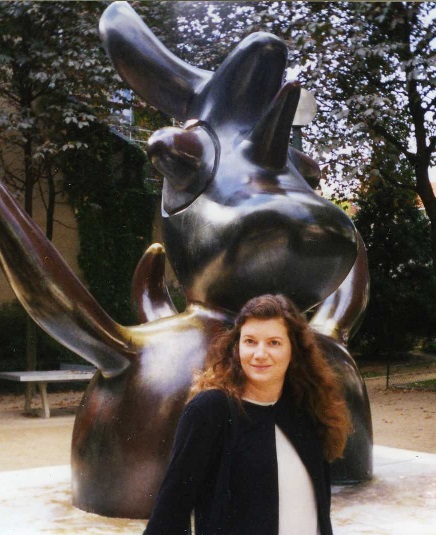
Kristin Harley works in APEX-ELM, Learning and Development, position management, and Volunteer Services at a major library system. She is also an indexer, an archival consultant and a writer and researcher who has been published in Skeptical Inquirer, Free Inquiry, The Indexer, Public Libraries, and Gemini. Her fiction has appeared in Ricky’s Back Yard, Sprout, Profane, and Deadly Quill. She is a former actress and dancer and does voice narration for e-learnings.
Original Creations
Goodbye for Now, a Short Story by Jennifer Weigel
What if ours weren’t the only reality? What if the past paths converged, if those moments that led to our current circumstances got tangled together with their alternates and we found ourselves caught up in the threads?
Marla returned home after the funeral and wake. She drew the key in the lock and opened the door slowly, the looming dread of coming back to an empty house finally sinking in. Everyone else had gone home with their loved ones. They had all said, “goodbye,” and moved along.
Her daughter Misty and son-in-law Joel had caught a flight to Springfield so he could be at work the next day for the big meeting. Her brother Darcy was on his way back to Montreal. Emmett and Ruth were at home next door, probably washing dishes from the big meal they had helped to provide afterward, seeing as their kitchen light was on. Marla remembered there being food but couldn’t recall what exactly as she hadn’t felt like eating. Sandwiches probably… she’d have to thank them later.
Marla had felt supported up until she turned the key in the lock after the services, but then the realization sank deep in her throat like acid reflux, hanging heavy on her heart – everyone else had other lives to return to except for her. She sighed and stepped through the threshold onto the outdated beige linoleum tile and the braided rag rug that stretched across it. She closed the door behind herself and sighed again. She wiped her shoes reflexively on the mat before just kicking them off to land in a haphazard heap in the entryway.
The still silence of the house enveloped her, its oppressive emptiness palpable – she could feel it on her skin, taste it on her tongue. It was bitter. She sighed and walked purposefully to the living room, the large rust-orange sofa waiting to greet her. She flopped into its empty embrace, dropping her purse at her side as she did so.
A familiar, husky voice greeted her from deeper within the large, empty house. “Where have you been?”
Marla looked up and glanced around. Her husband Frank was standing in the doorway to the kitchen, drying a bowl. Marla gasped, her hand shooting to her mouth. Her clutched appendage took on a life of its own, slowly relinquishing itself of her gaping jaw and extending a first finger to point at the specter.
“Frank?” she spoke hesitantly.
“Yeah,” the man replied, holding the now-dry bowl nestled in the faded blue-and-white-checkered kitchen towel in both hands. “Who else would you expect?”
“But you’re dead,” Marla spat, the words falling limply from her mouth of their own accord.
The 66-year old man looked around confusedly and turned to face Marla, his silver hair sparkling in the light from the kitchen, illuminated from behind like a halo. “What are you talking about? I’m just here washing up after lunch. You were gone so I made myself some soup. Where have you been?”
“No, I just got home from your funeral,” Marla spoke quietly. “You are dead. After the boating accident… You drowned. I went along to the hospital – they pronounced you dead on arrival.”
“I don’t know what you’re talking about,” Frank said. “What boating accident?”
“The sailboat… You were going to take me out,” Marla coughed, her brown eyes glossed over with tears.
“We don’t own a sailboat,” Frank said bluntly. “Sure, I’d thought about it – it seems like a cool retirement hobby – but it’s just too expensive. We’ve talked about this, we can’t afford it.”
Marla glanced out the bay window towards the driveway where the small sailboat sat on its trailer, its orange hull reminiscent of the Florida citrus industry, and also of the life jacket Frank should have been wearing when he’d been pulled under. Marla cringed and turned back toward the kitchen. She sighed and spoke again, “But the boat’s out front. The guys at the marina helped to bring it back… after you… drowned.”
Frank had retreated to the kitchen to put away the bowl. Marla followed. She stood in the doorway and studied the man intently. He was unmistakably her husband, there was no denying it even despite her having just witnessed his waxen lifeless body in the coffin at the wake before the burial, though this Frank was a slight bit more overweight than she remembered.
“Well, that’s not possible. Because I’m still here,” Frank grumbled. He turned to face her, his blue eyes edged with worry. “There now, it was probably just a dream. You knew I wanted a boat and your anxiety just formulated the worst-case scenario…”
“See for yourself,” Marla said, her voice lilting with every syllable.
Frank strode into the living room and stared out the bay window. The driveway was vacant save for some bits of Spanish moss strewn over the concrete from the neighboring live oak tree. He turned towards his wife.
“But there’s no boat,” he sighed. “You must have had a bad dream. Did you fall asleep in the car in the garage again?” Concern was written all over his face, deepening every crease and wrinkle. “Is that where you were? The garage?”
Marla glanced again at the boat, plain as day, and turned to face Frank. Her voice grew stubborn. “It’s right here. How can you miss it?” she said, pointing at the orange behemoth.
“Honey, there’s nothing there,” Frank exclaimed, exasperation creeping into his voice.
Marla huffed and strode to the entryway, gathering her shoes from where they waited in their haphazard heap alongside the braided rag run on the worn linoleum floor. She marched out the door as Frank took vigil in its open frame, still staring at her. She stomped out to the boat and slapped her hand on the fiberglass surface with a resounding smack. The boat was warm to the touch, having baked in the Florida sun. She turned back towards the front door.
“See!” she bellowed.
The door stood open, empty. No one was there, watching. Marla sighed again and walked back inside. The vacant house once again enveloped her in its oppressive emptiness. Frank was nowhere to be found.

So I guess it’s goodbye for now. Feel free to check out more of Jennifer Weigel’s work here on Haunted MTL or here on her website.
Original Series
Nightmarish Nature: Just Jellies
Today on Nightmarish Nature we’re gonna revisit The Blob and jiggle our way to terror. Why? ‘Cause we’re just jellies – looking at those gelatinous denizens of the deep, as well as some snot-like land-bound monstrosities, and wishing we could ooze on down for some snoozy booze schmoozing action. Or something.
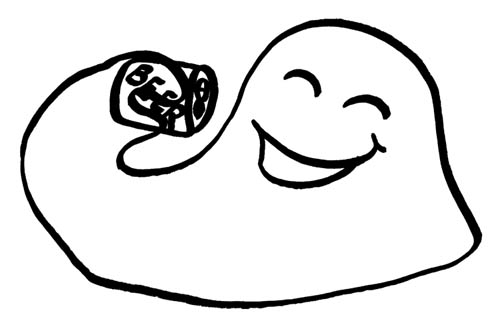
Honestly, I don’t know what exactly it is that jellyfish and slime molds do but whatever it is they do it well, which is why they’re still around despite being among the more ancient organism templates still in common use.
Jellyfish are on the rise.
Yeah, yeah, some species like moon jellies will hang out in huge blooms near the surface feeding, but that’s not what I meant. Jellyfish populations are up. They’re honing in on the open over-fished ocean and making themselves at home. Again.
And, although this makes the sea turtles happy since jellies are a favorite food staple of theirs, not much else is excited about the development. Except for those fish that like to hide out inside of their bells, assuming they don’t accidentally get eaten hanging out in there. But that’s a risk you gotta take when you’re trying to escape predation by surrounding yourself in a bubble of danger that itself wants to eat you. Be eaten or be eaten. Oh, wait…
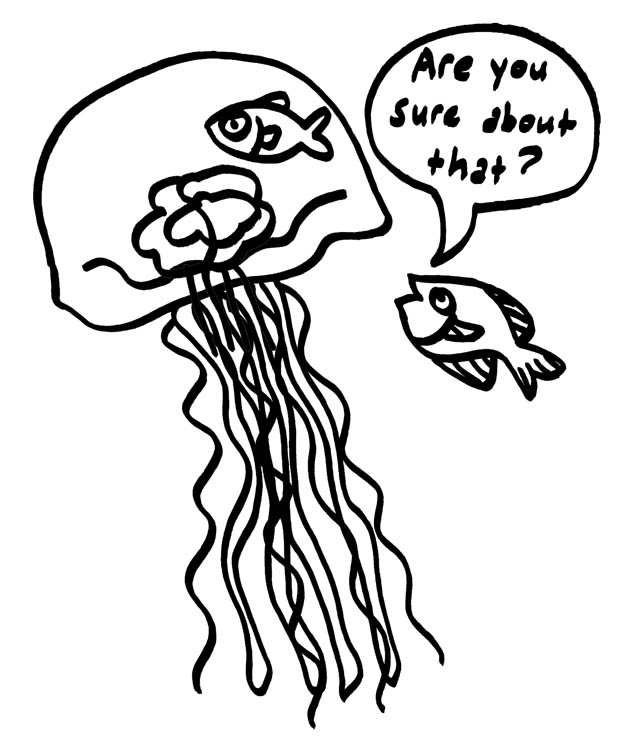
So what makes jellies so scary?
Jellyfish pack some mighty venom. Despite obvious differences in mobility, they are related to anemones and corals. But not the Man o’ War which looks similar but is actually a community of microorganisms that function together as a whole, not one creature. Not that it matters when you’re on the wrong end of a nematocyst, really. Because regardless what it’s attached to, that stings.
Box jellies are among the most venomous creatures in the world and can move of their own accord rather than just drifting about like many smaller jellyfish do. And even if they aren’t deadly, the venom from many jellyfish species will cause blisters and lesions that can take a long time to heal. So even if they do resemble free-floating plastic grocery bags, you’d do best to steer clear. Because those are some dangerous curves.
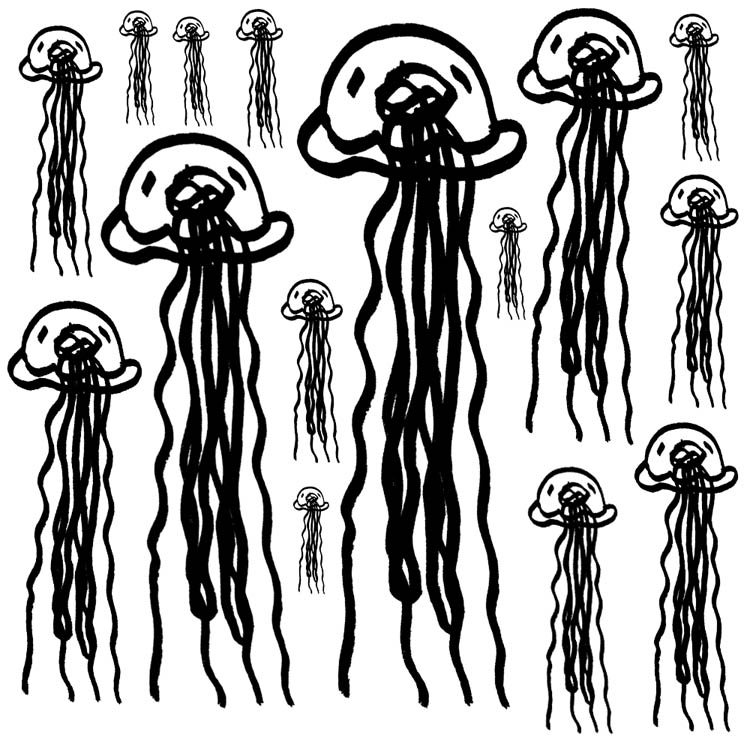
But what does this have to do with slime molds?
Absolutely nothing. I honestly don’t know enough about jellyfish or slime molds to devote the whole of a Nightmarish Nature segment to either, so they had to share. Essentially, this bit is what happened when I decided to toast a bagel before coming up with something to write about and spent a tad too much time in contemplation of my breakfast. I guess we’re lucky I didn’t have any cream cheese or clotted cream…
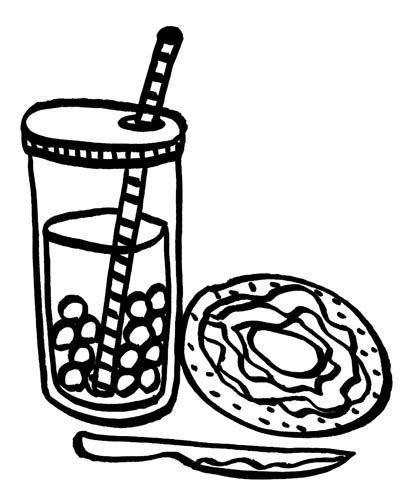
Oh, and also thinking about gelatinous cubes and oozes in the role-playing game sense – because those sort of seem like a weird hybrid between jellies and slime molds, as does The Blob. Any of those amoeba influenced creatures are horrific by their very nature – they don’t even need to be souped up, just ask anyone who’s had dysentery.
And one of the most interesting thing about slime molds is that they can take the shortest path to food even when confronted with very complex barriers. They are maze masterminds and would give the Minotaur more than a run for his money, especially if he had or was food. They have even proven capable of determining the most efficient paths for water lines or railways in metropolitan regions, which is kind of crazy when you really think about it. Check it out in Scientific American here. So, if we assume that this is essentially the model upon which The Blob was built, then it’s kind of a miracle anything got away. And slime molds are coming under closer scrutiny and study as alternative means of creating computer components are being explored.
Jellies are the Wave of the Future.
We are learning that there may be a myriad of uses for jellyfish from foodstuffs to cosmetic products as we rethink how we interact with them. They are even proving useful in cleaning up plastic pollution. I don’t know how I feel about the foodstuff angle for all that they’ve been a part of various recipes for a long time. From what I’ve seen of the jellyfish cookbook recipes, they just don’t look that appealing. But then again I hate boba with a passion, so I’m probably not the best candidate to consider the possibility.
So it seems that jellies are kind of the wave of the future as we find that they can help solve our problems. That’s pretty impressive for some brainless millions of years old critter condiments. Past – present – perpetuity! Who knows what else we’d have found if evolution hadn’t cleaned out the fridge every so often?
Feel free to check out more Nightmarish Nature here.
Original Series
Lucky Lucky Wolfwere Saga Part 4 from Jennifer Weigel
Continuing our junkyard dawg werewolf story from the previous St. Patrick’s Days… though technically he’s more of a wolfwere but wolfwhatever. Anyway, here are Part 1 from 2022, Part 2 from 2023 and Part 3 from 2024 if you want to catch up.
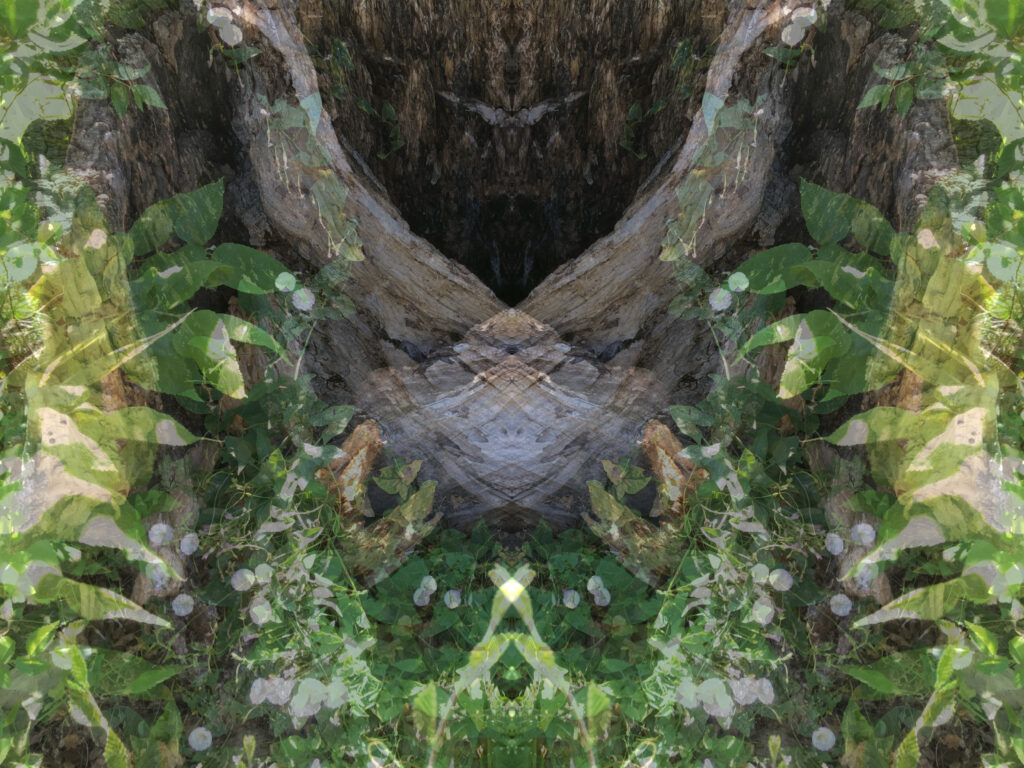
Yeah I don’t know how you managed to find me after all this time. We haven’t been the easiest to track down, Monty and I, and we like it that way. Though actually, you’ve managed to find me every St. Patrick’s Day since 2022 despite me being someplace else every single time. It’s a little disconcerting, like I’m starting to wonder if I was microchipped way back in the day in 2021 when I was out lollygagging around and blacked out behind that taco hut…
Anyway as I’d mentioned before, that Scratchers was a winner. And I’d already moved in with Monty come last St. Patrick’s Day. Hell, he’d already begun the process of cashing in the Scratchers, and what a process that was. It made my head spin, like too many squirrels chirping at you from three different trees at once. We did get the money eventually though.
Since I saw you last, we were kicked out of Monty’s crap apartment and had gone to live with his parents while we sorted things out. Thank goodness that was short-lived; his mother is a nosy one for sure, and Monty didn’t want to let on he was sitting on a gold mine as he knew they’d want a cut even though they had it made already. She did make a mean brisket though, and it sure beat living with Sal. Just sayin.
Anyway, we finally got a better beater car and headed west. I was livin’ the dream. We were seeing the country, driving out along old Route 66, for the most part. At least until our car broke down just outside of Roswell near the mountains and we decided to just shack it up there. (Boy, Monty sure can pick ‘em. It’s like he has radar for bad cars. Calling them lemons would be generous. At least it’s not high maintenance women who won’t toss you table scraps or let you up on the sofa.)
We found ourselves the perfect little cabin in the woods. And it turns out we were in the heart of Bigfoot Country, depending on who you ask. I wouldn’t know, I’ve never seen one. But it seems that Monty was all into all of those supernatural things: aliens, Bigfoot, even werewolves. And finding out his instincts on me were legit only added fuel to that fire. So now he sees himself as some sort of paranormal investigator.
Whatever. I keep telling him this werewolf gig isn’t all that it’s cracked up to be, and it doesn’t work like in the movies. I wasn’t bitten, and I generally don’t bite unless provoked. He says technically I’m a wolfwere, to which I just reply “Where?” and smile. Whatever. It’s the little things I guess. I just wish everything didn’t come out as a bark most of the time, though Monty’s gotten pretty good at interpreting… As long as he doesn’t get the government involved, and considering his take on the government himself that would seem to be a long stretch. We both prefer the down low.
So here we are, still livin’ the dream. There aren’t all that many rabbits out here but it’s quiet and the locals don’t seem to notice me all that much. And Monty can run around and make like he’s gonna have some kind of sighting of Bigfoot or aliens or the like. As long as the pantry’s stocked it’s no hair off my back. Sure, there are scads of tourists, but they can be fun to mess around with, especially at that time of the month if I happen to catch them out and about.
Speaking of tourists, I even ran into that misspent youth from way back in 2021 at the convenience store; I spotted him at the Quickie Mart along the highway here. I guess he and his girlfriend were apparently on walkabout (or car-about) perhaps making their way to California or something. He even bought me another cookie. Small world. But we all knew that already…
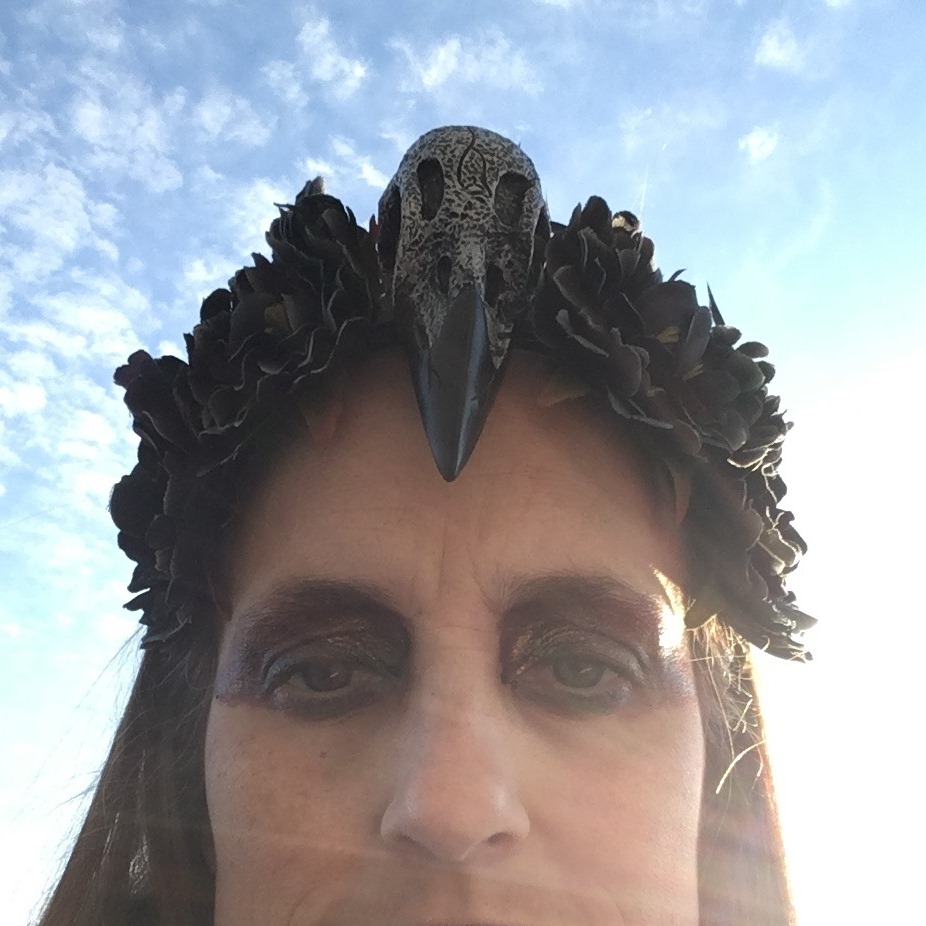
If you enjoyed this werewolf wolfwere wolfwhatever saga, feel free to check out more of Jennifer Weigel’s work here on Haunted MTL or here on her website.













